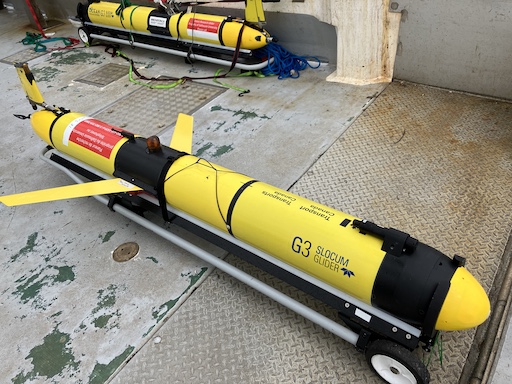Robots4Whales
University of New Brunswick
Laurentian Channel (Zone C/E), Gulf of St. Lawrence, Canada, April 2024
Study objectives
A Teledyne Webb Research Slocum G3s glider equipped with passive acoustic listening device (DMON/LFDCS) was deployed in the Laurentian Channel region of the Gulf of St. Lawrence (GoSL) for a multi-month mission with an extended lithium primary battery pack. The purpose of this mission is to monitor for North Atlantic right whales and use right whale acoustic detections to trigger dynamic management in Dynamic Shipping Zones C/E of the Laurentian Channel Traffic Separation Scheme.
Principal Investigators: Kim Davies (University of New Brunswick)
Analysts: Kate Indeck, Leila Fouda and Kim Davies (University of New Brunswick)

Platform location:

Analyst-reviewed species occurrence maps:

Daily analyst review:
| | Detected |
| Possibly detected |
| Not detected |
Time series:

Diel plot:

Recent bacgkground noise:

Links to detailed information:
Automated detection data
DMON/LFDCS Diagnostics
Platform diagnostics
Questions
Please email Mark Baumgartner at mbaumgartner@whoi.edu. For a general desciption of the detection system and the autonomous platforms, visit dcs.whoi.edu.
Acknowledgements
The G3s glider was expertly prepared by Teledyne Webb Research and the Coastal Environmental Observation Technology and Research (CEOTR) group (ceotr.ocean.dal.ca). Financial support for the deployment and operation of the glider was provided Transport Canada's Innovation Centre. Additional logistical support for the mission was provided by Woods Hole Oceanographic Institution, University of New Brunswick, Teledyne Webb Research, Dalhousie University, Ocean Tracking Network, and the Ocean Frontiers Institute.
Home





